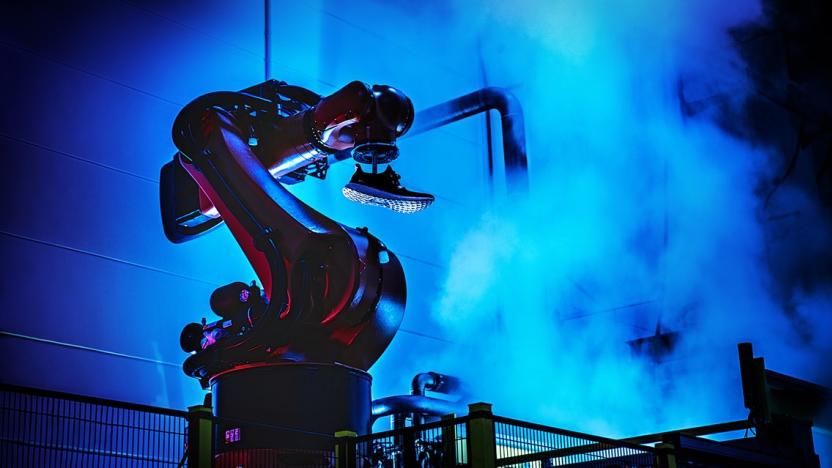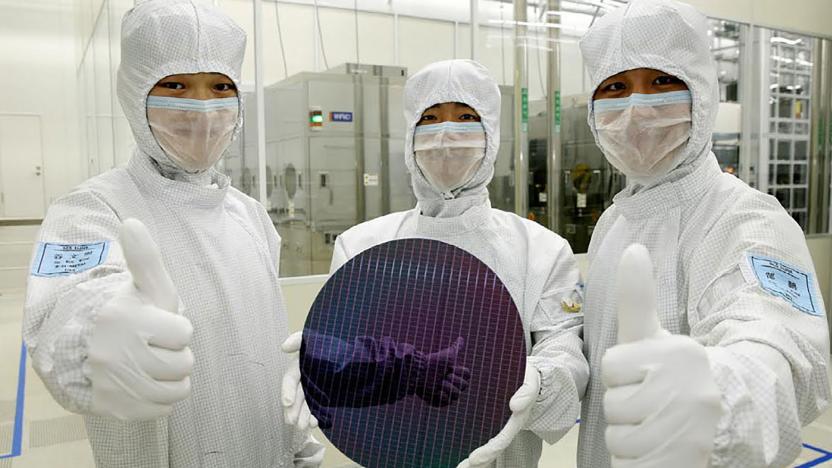manufacturing
Latest

Intel to manufacture ARM chips in a bid for mobile domination
Intel is flexing its manufacturing muscle in an attempt to get inside your next phone. To do that, it has entered a licensing deal with ARM, according to a report from Bloomberg. Without this license, excess manufacturing space goes to waste. But with it, Intel can make processors for Apple, Qualcomm and Samsung -- the biggest players in smartphones. This gives Intel a much-needed boost in the mobile space that it couldn't achieve on its own.

Adidas will bring its robot-staffed factory to Atlanta in 2017
Late last year, Adidas announced plans to bring shoe production back to Germany starting in 2016. With that in mind, the company created a new manufacturing facility staffed by robots, known as Speedfactory. Along with setting one up in its native country, Adidas also revealed there would be a separate Speedfactory in the US, slated to open in 2017. Today, the sportswear giant shared more details about this project, announcing that its Stateside production facility will call Atlanta home. The 74,000-square-foot space is set to be fully functional by the end of next year, and Adidas says it aims to make 50,000 pairs of running shoes there.

Ford's new robots can build cars, make coffee
This new robotic technology could be a big help to assembly workers and offer more design freedom. Ford Motor Company announced today its early testing of a new type of assembly line robot that were co-developed with German robotics company KUKA Roboter GmbH with the intention of assisting human line workers. Two of these three-foot-tall machines are in use at the Cologne, Germany factory, where they assist human workers to install shock absorbers on Ford Fiestas. These workers would have originally had to juggle the shocks and tools to install them, but now the robot helps them position and install the parts.

Adidas uses robots to bring shoe production back to Germany
Years ago, clothing manufacturers started moving production to developing nations where the labor costs were cheap and employees were plentiful. Proponents of globalization said that jobs going to poorer regions was a great thing, but sportswear firms paying workers pennies to make $100 shirts certainly isn't. But now, the robot revolution is likely to cause a retreat from the days of fashion houses opening sweatshops in far-flung lands. And Adidas, which has often come under fire for its use of unethical labor practices, is leading the charge.

Indiegogo deal helps crowdfunders make their gadgets
Indiegogo has made some effort to help get crowdfunded projects off the ground, but it has mostly focused on big companies so far. What about startups still grappling with the basics of making devices? Don't worry: they're getting some help now, too. Indiegogo has formed a partnership with Arrow Electronics to help crowdfunders produce their inventions. If Arrow thinks a project is both feasible and important, it'll offer direct access to design, manufacturing support and supply chain services (including engineers) worth as much as $500,000. The recipients also get discounts on parts and software, and there's a badge to show Arrow's approval on campaign pages.

Trump claims he'd make Apple build devices in the US
Donald Trump isn't known for having a firm grasp of technology-related issues, and he just reinforced those beliefs on Monday. The hopeful Republican presidential nominee told an audience at Liberty University that he'd make Apple "build their damn computers in this country," rather than sending the work to China and elsewhere. It sure sounds like a great idea, especially in light of increasing efforts to bring tech manufacturing stateside. However, there doesn't appear to be much evidence that this will happen -- or even that it can happen.

Report: Samsung will start building chips for AMD
With falling smartphone sales, Samsung has been trying to boost its chip manufacturing business. AMD, meanwhile, builds CPUs and GPUs for PCs and both major consoles, but doesn't have a fab business anymore. According to Korea's Electronic Times, that kind of synergy was too good to ignore, so Samsung will manufacture CPU and GPU chips for AMD on its 14-nanometer chip foundry starting in 2016. All of AMD's chips are currently manufactured by GlobalFoundries, an Abu Dhabi-owned firm that once belonged to AMD. Both Samsung and GlobalFoundries will reportedly manufacture AMD's latest "Greenland" GPUs and "Zen" CPUs using a 14-nanometer process, which will make them faster and more energy-efficient than previous AMD chips .

Samsung wants to get into the self-driving car business
It's too soon to crack wise that Apple will design a self-driving car and Samsung will build it, but we're another step closer to that being a reality. The Korean conglomerate is launching a new division of its business that'll manufacture car components for other companies, beginning with in-car infotainment gear. According to the release, the eventual aim is to branch out into the components necessary to build autonomous vehicles for other companies. The move follows that of its local rival LG, which formed a vehicle components division in 2013 and is now gearing up to produce components for car companies.

Indiegogo and Brookstone want to deliver crowdfunded products faster
One of this biggest issues facing crowdfunded products is the amount of time between backing a project and when you actually receive the goods. Indiegogo is looking to do something about that with the help of the tech-minded retail store Brookstone. Aspiring startups and makers can submit ideas to a specific page of Indiegogo's site where the retailer will offer design, manufacturing, packaging, distribution, sales and customer support to selected projects. As you might expect, Brookstone won't just back any ol' idea, as the store is looking for items that fit its reputation for technology, wellness, home and travel wares. There will also be a "Funded with Indiegogo" section of the company's retails stores that'll include products like the Fizzics beer dispenser and Axents's Cat Ear Headphones. The partnership seems like a win for both companies as Indiegogo's inventors have the opportunity to tap into an established product chain and Brookstone can use the crowdfunded projects to stock its shelves with new items. [Image credit: LA Times via Getty Images]

Samsung bets on OLED as smartphone sales decline
It's easy to forget that Samsung is a multi-tentacled company that builds much more than TVs and phones. For instance, it manufactures CPUs for arch-foe Apple and makes small-to-medium OLED panels for various companies, not just its own mobile division. According to Reuters, Samsung will invest another $3.6 billion into its OLED business to offset flagging smartphone sales. Most of that cash will go into a new production line producing curved panels for the Galaxy Note edge and third-party devices. And Samsung's not the only South Korean manufacturer dumping more money into OLEDs. LG will also stake nearly $1 billion on new OLED capacity for large-panel items like TVs, as well. The takeaway? Given the display dominance of the two companies, many more OLED devices -- both big and small -- should be hitting the market soon.

HP wants to be a 3D printing giant with new 'Multi Jet Fusion' tech
HP has just revealed a lot more information about the 3D printing technology it teased dramatically a few months ago. It's called "Multi Jet Fusion," and the company thinks it can "change entire industries." The original goal was to make 3D printers build objects at higher resolution and much, much faster, speeds. Based on the demos we saw today, that claim looks feasible. Essentially, the 3D printer builds parts similar to how an inkjet printer produces documents -- the "ink" is applied to a material coating, then heated and fused to build up layers (see below). That's substantially different to how mainstream 3D printers work, and HP said that it could make products like gears at least ten times faster than conventional manufacturing techniques.

EVE Evolved: Has the industry revamp worked?
When I was first introduced to EVE Online back in 2004, a big part of the attraction for me was the promise of a huge player-run economy in which the only real laws were those of supply and demand. With only a handful of tech 1 ships and modules available to build and everything made out of the same basic minerals, science and industry were pretty easy for new players to figure out. Over the years, more complexity has slowly been added to industry via features like Starbases, Salvaging, Capital Ships, Tech 2 Invention, Planetary Interaction and Tech 3 Reverse Engineering. Today's industrialists have to contend with hundreds of different items that are often arranged in sprawling component manufacturing chains, which can make it hard to figure out exactly how to make a profit. The recent industry revamp attempted to solve this problem with a full user interface overhaul and a revamp of material costs and manufacturing prices. All of the relevant information for using a blueprint was packed into a slick new combined Industry UI, allowing new players to find the info they're looking for in-game rather than through websites or opening dozens of item info windows. It's now been almost two months since the industry revamp went live, and while the market for many items is still going to take several months to fully stabilise, the dust has finally begun to settle. So what's the verdict? Has the industry revamp worked? In this edition of EVE Evolved, I consider whether the industry revamp has been successful, how easy it is to make a profit in the new system, and whether it's worth setting up your own industrial starbase.

Apple bans the use of two potentially harmful chemicals in final device assembly
Apple has banned the use of two potentially harmful chemicals in the final assembly of its devices. This ban was confirmed by vice president of environmental initiatives Lisa Jackson in a statement posted on Apple's Environmental Responsibility website. Recently, we received some questions about whether the chemicals benzene and n-hexane are used in the manufacturing of our products. Apple treats any allegations of unsafe working conditions extremely seriously. We took immediate investigative action, sending specialized teams into each of our 22 final assembly facilities, and found no evidence of workers' health being put at risk. We've updated our tight restrictions on benzene and n-hexane to explicitly prohibit their use in final assembly processes. Apple is requiring its manufacturers to remove the chemicals, benzene and n-hexane, from the assembly process and to test all cleaning agents and degreasers used in the final assembly of devices for these chemicals. The company is working with manufacturers to find safer alternatives. As part of its committment to produce both a safe product and a safe working environment, Apple also is creating a new advisory board to reduce the use of other toxins in its supply chain. [Image from Apple's website]

EVE Evolved: Making ISK from the Crius release
EVE Online's economy has been studied over the years for its resemblance to the real world, and it is often cited as an example of a hyper-capitalist society with no laws or regulation. But underneath the emergent interplay of supply and demand that has fueled everything from freighter businesses to virtual investment banks, EVE is ultimately a game. The biggest influence on the markets by far has always been CCP Games and the changes it deploys in expansions, which shake the universe up and force players to adapt to new circumstances. There's always money to be made from major gameplay changes, and accurately predicting how an expansion will impact on the market can put you on the head of a short-lived but very lucrative gold rush. Though EVE's updates now come in the form of ten smaller releases per year, the upcoming Crius release scheduled for July 22nd has practically a whole expansion's worth of changes to industry and research. That gives you just over two weeks to prepare for the change, train any skills you might need, and figure out how to cash in on EVE's industrial revolution. In this edition of EVE Evolved, I run down some tips for how to prepare for the upcoming industry revamp in Crius and make some ISK.

White House helps tech startups make advanced parts
It's one thing to come up with a clever product idea, but it's something else to actually build it; it can be tough to find the materials you need, let alone the tools to put everything together. That's where a new round of White House initiatives might just lend a helping hand. As part of its open data efforts, the administration is upgrading its research data site so that startups can easily find government manufacturing and research facilities; the Department of Energy and NASA have outlets dedicated to working on clean energy and aeronautics, for example. The project will eventually surface government-backed patents and other manufacturing info that's frequently tough to track down.

Motorola to close its Moto X plant in Texas by the end of the year
Motorola became part of a growing trend when it opened a plant in Texas to build its flagship Moto X, but just a year on, its now decided to shut down its US manufacturing operations. According to The Wall Street Journal, employee numbers have plummeted from nearly 4,000 when it was in full swing to only 700, and the plan is to close the factory by the end of the year. Motorola's intention was to offset the inherently higher cost of manufacturing in the US, compared with places like China, by being able to get handsets to customers quicker, and manage the Moto Maker customization process on home turf. But, despite churning out 100,000 Moto Xs a week at one point and progressively making the handset cheaper, the 'born in the USA' vision hasn't paid dividends.

EVE Fanfest 2014: EVE's Kronos expansion is an industrial revolution
The EVE Online keynote presentation finished just a few hours ago at EVE Fanfest 2014, and it looks as if there are big plans for the year ahead. This summer will bring us the Kronos expansion, which is scheduled for June 3rd and aims to revolutionise every aspect of industrial activity in EVE Online in terms of both gameplay and accessibility. The economy has become quite stagnant over the past year as players have long since worked out all the most efficient ways to manufacture and trade, so CCP has planned its very own industrial revolution with a complete overhaul of industrial gameplay. Kronos also marks another important milestone for CCP, as the company will be switching from releasing two major expansions per year to a more agile strategy of releasing 10 smaller updates each year. The Kronos release was originally planned as a full expansion before the changeover to a 10-release schedule, so it's as packed as a full expansion. In addition to a deluge of industry overhauls, we'll be getting a shiny new mining ship, major pirate faction ship revamps, an enhanced new player experience, and a cool new effect when players warp into or out of an area. Read on for a breakdown of the EVE keynote presentation and to find out why CCP is moving away from its usual two expansions per year.

Watch a tiny, magnetically powered robot construction crew go to work
A robot doesn't have to big, powerful and terrifying to be worthwhile, and many people are working on miniature machines that are just as cool. Some of these endeavors show promise in medicine, but there are plenty of potential uses for microbots, especially when you can persuade a swarm of them to work together. Research outfit SRI reckons tiny automatons have a bright future in manufacturing, thanks to its new method for precisely controlling individuals within a larger group. You see, one of the best ways of propelling and controlling microbots is by using magnets. and it's because there's no need for an on-board power source that we can make 'em so small. This poses a problem, however, as a pack of bots will all respond to a magnetic field in the same way, making it hard to give anything but a blanket order.

EVE Evolved: Mining is broken, but it can be fixed
Mining has a reputation for being the most boring activity in EVE Online, but it's always filled a niche role as a low-effort way to make ISK and play with friends casually. When there's no PvP going on and you can't give your full attention to smashing NPCs in missions or anomalies, mining fills that downtime with something more lucrative and social than spinning your ship in a station. The problem is that mining has slowly become obsolete over the years; alternative mineral sources now supply much of the market's needs, and the risk of flying a defenseless barge just isn't worth the mediocre payout. It's currently more efficient for an individual to buy minerals with ISK made via some other form of PvE, such as level 4 missions or incursions. And on the macroscopic level, such huge quantities of minerals hit the market from alternative sources such as reprocessing loot that the economy could potentially function with no miners at all. CCP has tried to make mining more appealing over the years with buffs and new ships, and the devs recently announced plans to nerf mineral compression as part of a campaign to make mining worthwhile, but I think it'll take a lot more than ISK to get people mining again. In this week's EVE Evolved, I look at how mining and reprocessing are at odds and suggest some ideas for new mining features that could revitalise this long forgotten profession.

What Lenovo's Motorola deal could mean for American manufacturing
Lenovo purchasing Motorola from Google raises a lot of questions. But, lost amid all the speculation over what this means for the marketplace, is the potential human cost. Motorola directly employs over 4,000 people, many of them at its headquarters in Libertyville, Ill. -- a wealthy suburb north of Chicago rich with brick single-family homes and more trees than people. For the moment, at least, those employees and the executive team appear to be safe. During yesterday's conference call following the announcement of the deal, Lenovo officials said there were no immediate plans for layoffs or a leadership shakeup. Things are a little more uncertain for those who rely indirectly on Motorola for their paycheck, for example the people working the Moto X assembly line in Fort Worth, which is run by subcontractor Flextronics.










